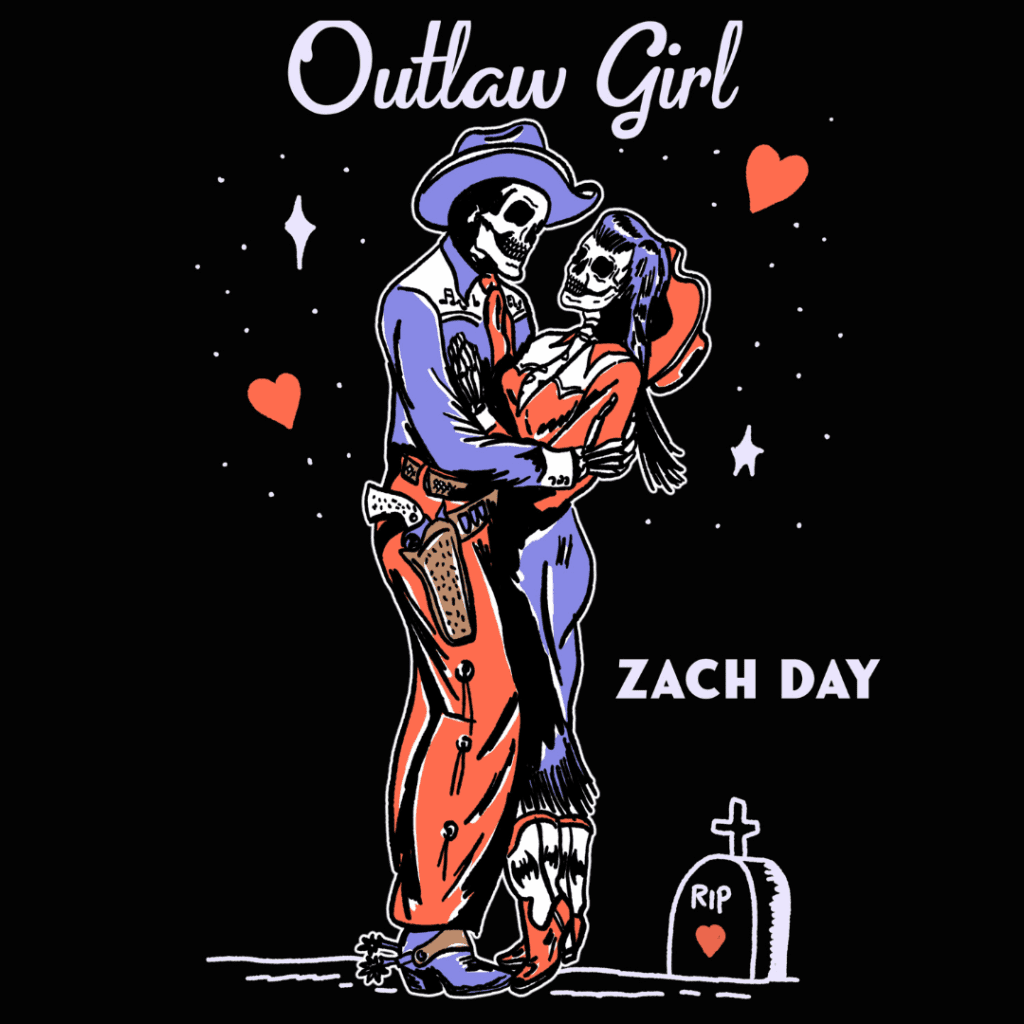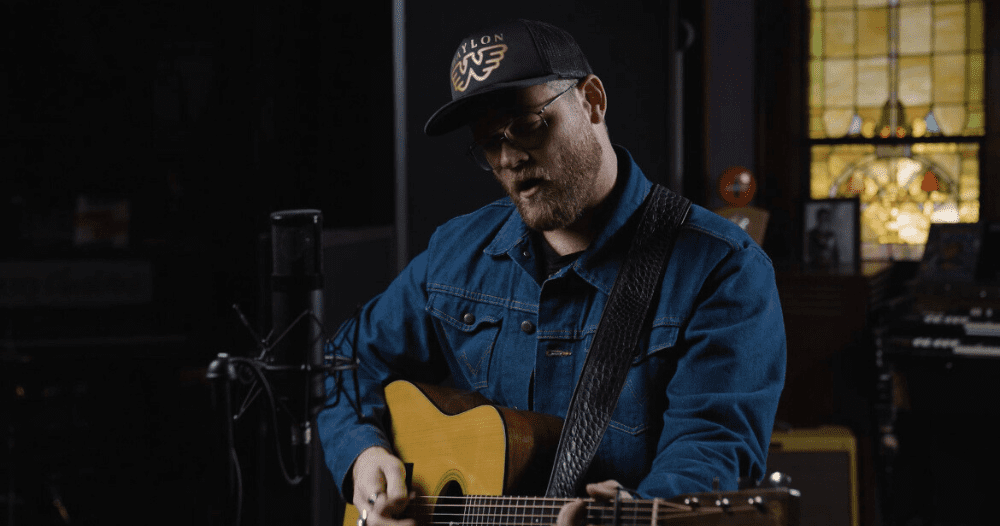In this intimate conversation, we dive deep into the soulful melodies of Zach Day ‘s music. Join us as we unravel the layers of inspiration behind Zach‘s latest release, “Outlaw Girl,” and explore the rich tapestry of sound and story that defines his unique musical style.
“Outlaw Girl” has been described as a soul-stirring anthem blending blues with alt-country. What inspired you to merge these genres, and how do you think it enhances the storytelling in your music?
I think, for me, it comes from getting my start as a blues guitarist, playing with Buddy Guy and Walter Trout, and meeting greats like B.B King, just shaped my whole outlook on music. As a songwriter, there has always been a dissonance between my musical upbringing in blues and my actual upbringing. I grew up in between a couple of cornfields outside of Summitville Indiana, listening to traditional country music. I still remember hearing my parents’ Willie Nelson and George Strait records over and over and not really understanding the appeal until I was older. Mixing these genres, to me, is just pulling from two things that don’t get mentioned enough in the same sentence. Blues and Country. Not so far apart.

Your upbringing in Indiana and exposure to blues music seem to have greatly influenced your musical journey. Can you share how your roots shape the stories you tell through your music, particularly in “Outlaw Girl”?
As mentioned before, the roots are so deeply connected. Yet blending blues and alt-country in a new, fresh way is sort of an ever-evolving process for me. In some songs, like “Outlaw Girl,” you hear strong country roots, with a honky tonk blues guitar solo at the end, while other songs on my upcoming album “Throw Away The Pin,” play tribute to blues legends Muddy Waters and Robert Johnson. The initial lyrics nearly always come from my roots in classic country music and americana. Even drawing inspiration from newer writers like Jason Isbell, Charley Crockett, Sturgill Simpson, and many others.
The lyrics of “Outlaw Girl” paint a vivid picture of characters grappling with their pasts and seeking redemption. Could you delve into the themes explored in the song and what inspired you to write about them?
“Outlaw Girl,” like so many songs that I write comes from stories I see, hear, or experience, often with underlying meanings hidden throughout using metaphors and a lot of lines that have two or three underlying meanings. The theme that stands out at the most surface level to me is the main character’s slow-burning desire to kill her husband. A chorus that repeatedly states that she is mainly just a small-town girl who doesn’t go out and party on the weekends drinks a little whiskey, is close to her dad, and likes to write songs, but as she reflects over the past, the things that could have been, she longs for more and believes that there may only be one way to achieve that. So seeking redemption in her case is a slightly dark situation.
Drawing comparisons to esteemed artists like Tyler Childers and Zach Bryan, how do you navigate the balance between honoring your influences and carving out your unique sound, especially in “Outlaw Girl”?
I think for me, it is always about having so many different influences, that you form your sound by combining so many different types of ideas. Guys like Zach Bryan, Benjamin Tod, Jason Isbell, and John Prine can form a story that just draws you in. These storytellers, while so specific in their writing, leave just enough open ends that make each song so easy to relate to. So for me, pulling from those parts of each influence doesn’t spill over into my sound as much as just my approach to writing a song. Guys like Tyler Childers, Sturgill Simpson, Waylon Jennings, and Charley Crockett can draw you in with their style and themes so well. To me “Outlaw Girl” feels like it pulls in so many different influences to form a sound that really is familiar but fresh in its own way.
Your bio mentions your parents’ decision to open an all-ages blues club, providing a platform for your early performances. How did this experience shape you as a musician and performer, and did it influence the creation of “Outlaw Girl” in any way?
So ya, when I was 16 years old, my parents and my aunt opened and ran an all-ages blues club out of an old church building, and they really did it as a way for me to perform and hone my skills. Looking back now, it is so easy to see how much it shaped me into the player and performer I am now. Also, equally as important, it allowed me to build a great band with steady work. Back then, I did not sing at all, so my dad sang the songs while I played the guitar. My drummer, Steve Rowland, has been with me since the very first show in that old church and still performs every show with me. He is just the best of the best. So I look back on all the relationships that were built with musicians or fans that became friends, and the experience of what we were able to do is priceless.
“Outlaw Girl” serves as a testament to your evolution as an artist. Can you talk about the journey you’ve been on since you began writing your album, “Throw Away The Pin,” and how “Outlaw Girl” fits into that narrative?
In 2013, I recorded my first album, “Deeper Shade Of Blue.” A straight-up blues album tracked and mixed in a couple of days, really no overdubs, and what we tracked is what we got. I still love listening back to that record, to show what we were doing in the blues genre then and really to enjoy where the band was at the time. I was a senior in high school then and tracked my next album 3 years later when I was studying Jazz at Ball State University. This album was called “Redefined” and was my take on expanding out of the blues genre while leaving the underlying tone very blues-based. The album turned out alright but was my first album in which I sang every song and wrote every song. It was just a lot to bite off at the time. The next handful of years, we were performing a lot and enjoying the circuit of shows and I really didn’t write as much. Being a full-time musician, I sort of just focused on the parts of music that would make me more money. Fast forward to a couple of years ago, 2021, when I began putting out a single each month for an entire year. I felt like I had done myself quite a disservice by not focusing on my own music and was determined to get some new things out. This is when my writing really began to change, I had started listening to Jason Isbell’s “Southeastern” record a lot and really wanted that type of writing to start showing up in my own songs. Many of the songs really captured that spirit and that vibe while others were even more in an alternative rock direction, with songs like “Just The Same” and “Need Your Help.” As I kept writing, with this new approach, songs like “Outlaw Girl,” Throw Away The Pin,” Outside Looking In,” started coming out in my writing sessions. And over a year or two the songs from this album just kind of wrote themselves.
Looking ahead, what can fans expect from you in terms of future projects or collaborations, and how do you envision your musical journey unfolding in the years to come, following the release of “Outlaw Girl”? Are we anticipating more new songs in 2024?
Right now, I am really excited to play this album live and travel a bit with it. Next month, our next single off the album is coming out, the title track “Throw Away The Pin.” And the month after that, we are going to release one more single, then drop the whole album! Which is 16 songs spread out over a handful of instrumental extensions of the songs and two classic blues songs at the end. We are already planning our next EP and hoping to release it in the late fall as well. I’m really looking forward to building on this release and just gaining one listener at a time.
With heartfelt appreciation, we thank Zach Day for sharing his insights and passion for music with us. As we eagerly anticipate the next chapter of his musical journey, may the echoes of “Outlaw Girl” continue to resonate, reminding us of the timeless allure of authentic storytelling through song.
Listen to “Outlaw Girl” here:






